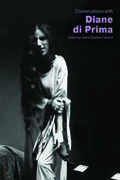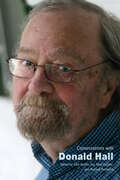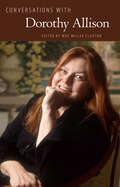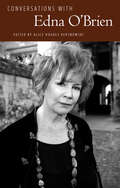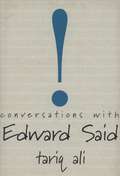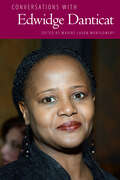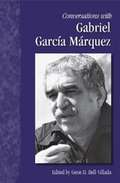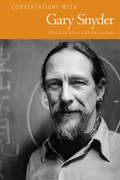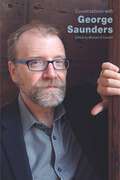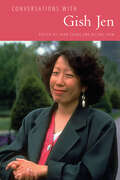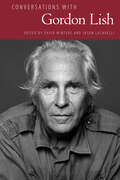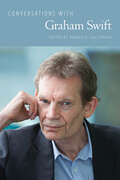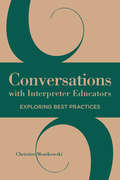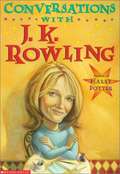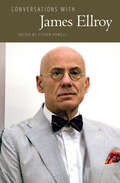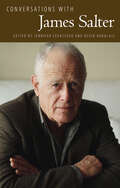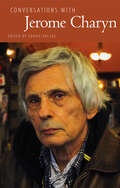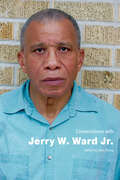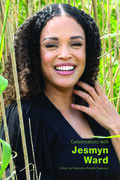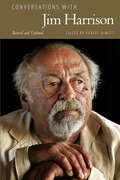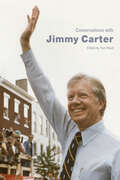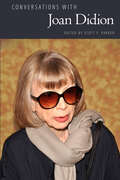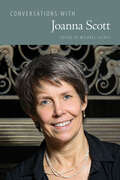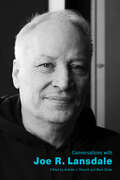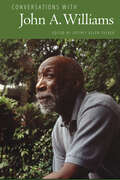- Table View
- List View
Conversations with Diane di Prima (Literary Conversations Series)
by David Stephen CalonneDiane di Prima (1934–2020) was one of the most important American poets of the twentieth century, and her career is distinguished by strong contributions to both literature and social justice. Di Prima and LeRoi Jones (Amiri Baraka) edited The Floating Bear (1962–69), one of the most significant underground publications of the sixties. Di Prima’s poetry and prose chronicle her opposition to the Vietnam War; her advocacy of the rights of Blacks, Native Americans, and the LGBTQ community; her concern about environmental issues; and her commitment to creating a world free of exploitation and poverty. In addition, di Prima is significant due to her challenges to the roles that American women were expected to play in society. Her Memoirs of a Beatnik was a sensation, and she talks about its lasting impact as well. Conversations with Diane di Prima presents twenty interviews ranging from 1972 to 2010 that chart di Prima’s intellectual, spiritual, and political evolution. From her adolescence, di Prima was fascinated by occult, esoteric, and magical philosophies. In these interviews readers can see the ways these concepts influenced both her personal life and her poetry and prose. We are able to view di Prima’s life course from her year at Swarthmore College; her move back to New York and then to San Francisco; her studies of Zen Buddhism; her fascination with the I Ching, Paracelsus, John Dee, Heinrich Cornelius Agrippa, alchemy, Tarot, and Kabbalah; and her later engagement with Tibetan Buddhism and work with Chögyam Trungpa. Another particularly interesting aspect of the book is the inclusion of interviews that explore di Prima’s career as an independent publisher—she founded Poets Press in New York and Eidolon Editions in California—and her commitment to promoting writers such as Audre Lorde. Taken together, these interviews reveal di Prima as both a writer of genius and an intensely honest, direct, passionate, and committed advocate of a revolution in consciousness.
Conversations with Donald Hall (Literary Conversations Series)
by John Martin-Joy, Allan Cooper and Richard RohfritchConversations with Donald Hall offers a unique glimpse into the creative process of a major American poet, writer, editor, anthologist, and teacher. The volume probes in depth Hall’s evolving views on poetry, poets, and the creative process over a period of more than sixty years. Donald Hall (1928–2018) reveals vivid, funny, and moving anecdotes about T. S. Eliot, Ezra Pound, and the sculptor Henry Moore; he talks about his excitement on his return to New Hampshire and the joys of his marriage with Jane Kenyon; and he candidly discusses his loss and grief when Kenyon died in 1995 at the age of forty-seven. The thirteen interviews range from a detailed exploration of the composition of “Ox Cart Man” to the poems that make up Without, an almost unbearable poetry of grief that was written following Jane Kenyon’s death. The book also follows Hall into old age, when he turned to essay writing and the reflections on aging that make up Essays after Eighty. This moving and insightful collection of interviews is crucial for anyone interested in poetry and the creative process, the techniques and achievements of modern American poetry, and the elusive psychology of creativity and loss.
Conversations with Dorothy Allison (Literary Conversations Series)
by Mae Miller ClaxtonSince the publication of her groundbreaking novel, Bastard Out of Carolina, Dorothy Allison (b. 1949) has been known—along with Larry Brown and Lee Smith—as a purveyor of the working-class, contemporary South. Allison has frequently used her position, through passionate lectures and enthusiastic interviews, to give voice to issues dear to her: poverty, working-class life, domestic violence, feminism and women’s relationships, the contemporary South, and gay/lesbian life. Often called a “writer-rock star” and a “cult icon,” Allison is a true performer of the written word. At the same time, Allison also takes the craft of writing very seriously. In this collection, spanning almost two decades, Allison the performer and Allison the careful craftsperson both emerge, creating a portrait of a complex woman. In the absence of a biography of Allison’s life, Conversations with Dorothy Allison presents Allison’s perspectives on her life, literature, and her conflicted role as a public figure.
Conversations with Edna O'Brien (Literary Conversations Series)
by Alice Hughes Kersnowski“Who’s afraid of Edna O’Brien?” asks an early interviewer in Conversations with Edna O’Brien. With over fifty years of published novels, biographies, plays, telecasts, short stories, and more, it is hard not to be intimidated by her. An acclaimed and controversial Irish writer, O’Brien (b. 1930) saw her early works, starting in 1960 with The Country Girls, banned and burned in Ireland, but often read in secret. Her contemporary work continues to spark debates on the rigors and challenges of Catholic conservatism and the struggle for women to make a place for themselves in the world without anxiety and guilt. The raw nerve of emotion at the heart of her lyrical prose provokes readers, challenges politicians, and proves difficult for critics to place her.In these interviews, O’Brien finds her own critical voice and moves interviewers away from a focus on her life as the “once infamous Edna” toward a focus on her works. Parallels between Edna O’Brien and her literary muse and mentor, James Joyce, are often cited in interviews such as Philip Roth’s description of The Country Girls as a “rural Dubliners.” While Joyce is the centerpiece of O’Brien’s literary pantheon, allusions to writers such as Shakespeare, Chekhov, Beckett, and Woolf become a medium for her critical voice. Conversations with contemporary writers Philip Roth and Glenn Patterson reveal Edna O’Brien’s sense of herself as a contemporary writer. The final interview included here, with BBC personality William Crawley at Queen’s University Belfast, is a synthesis of her acceptance and fame as an Irish writer and an Irish woman and an affirmation of her literary authority.
Conversations with Edward Said
by Tariq Ali Edward W. SaidEdward Said speaks with Tariq Ali about his dislocated existence, his initiation into politics, his involvement with the Palestinian cause, his approach to the study of culture, and his pervasive love of literature and music.
Conversations with Edwidge Danticat (Literary Conversations Series)
by Maxine Lavon MontgomeryThis volume sheds a much-needed light on Edwidge Danticat (b. 1969) and her ability to depict timely issues in sparkling prose that delves deep into the borderlands, an uncharted in-between space located outside fixed geographic, cultural, and ideological bounds. Prevalent throughout many interviews here is Danticat's expressed determination not only to reveal Haitian immigrant experience, but also to make that nuanced culture and its vibrant traditions accessible to a wide audience.These interviews coincide with Edwidge Danticat's evolving artistic vision, her steady book publication, and her expanding roles as fiction writer, essayist, memoirist, documentarian, young adult book author, editor, songwriter, cultural critic, and political commentator. Dating from her appearance on the literary scene at the age of twenty-five, the many interviews that she has granted attest to not only her productivity, but also her accessibility to scholars, teachers, writers, and journalists eager for knowledge about her vision. Included in this volume are interviews that range from 2000, covering the publication of her debut work of fiction, Breath, Eyes, Memory, to a personal interview conducted with the volume editor in 2016. In that conversation, which appears for the first time as part of this collection, Danticat provides insight into little-known aspects of her life, art, and politics.Her candid interviews carry out a careful stripping away of preconceived notions of Danticat, disclosing the private and public life of a first-class writer and intellectual whose countless achievements have assured her an enduring place within contemporary world letters.
Conversations with Gabriel García Márquez
by Gabriel García Márquez Gene H. Bell-VilladaCollected interviews which offer a nuanced, multifaceted view of one of contemporary literature's greatest masters. The interviews span the period from 1971 to 1997 and were previously published in such periodicals as Playboy, The New York Times, and the Spanish magazine Triunfo. Garcia Marquez reflects upon his work, his political views, and his life.
Conversations with Gary Snyder (Literary Conversations Series)
by David Stephen CalonneGary Snyder (b. 1930) is one of the most distinguished American poets, remarkable both for his long and productive career and for his equal contributions to literature and environmental thought. His childhood in the Pacific Northwest profoundly shaped his sensibility due to his contact with Native American culture and his early awareness of the destruction of the environment by corporations. Although he emerged from the San Francisco Renaissance with writers such as Kenneth Rexroth, Robert Duncan, and William Everson, he became associated with the Beats due to his friendships with Allen Ginsberg and Jack Kerouac, who included a portrait of Snyder as Japhy Ryder in his novel The Dharma Bums. After graduating from Reed College, Snyder became deeply involved with Zen Buddhism, and he spent twelve years in Japan immersed in study.Conversations with Gary Snyder collects interviews from 1961 to 2015 and charts his developing environmental philosophy and his wide-ranging interests in ecology, Buddhism, Native American studies, history, and mythology. The book also demonstrates the ways Snyder has returned throughout his career to key ideas such as the extended family, shamanism, poetics, visionary experience, and caring for the environment as well as his relationship to the Beat movement. Because the book contains interviews spanning more than fifty years, the reader witnesses how Snyder has evolved and grown both as a poet and philosopher of humanity's proper relationship to the cosmos while remaining committed to the issues that preoccupied him as a young man.
Conversations with George Saunders (Literary Conversations Series)
by Michael O’ConnellBesides being one of America’s most celebrated living authors, George Saunders (b. 1958) is also an excellent interview subject. In the fourteen interviews included in Conversations with George Saunders, covering nearly twenty years of his career, the Booker Prize–winning author of Lincoln in the Bardo and Tenth of December provides detailed insight into his own writing process and craft, alongside nuanced interpretations of his own work. He also delves into aspects of his biography, including anecdotes from his childhood and his experiences as both a student and teacher in MFA programs, as well as reflections on how parenthood affected his writing, the role of religious belief and practice in his work, and how he has dealt with his growing popularity and fame. Throughout this collection, we see him in conversation with former students, fellow writers, mainstream critics, and literary scholars. In each instance, Saunders is eager to engage in meaningful dialogue about what he calls the “big questions of our age.” In a number of interviews, he reflects on the moral and ethical responsibility of fiction, as well as how his work engages with issues of social and political commentary. But at the same time, these interviews, like all of Saunders’s best work, are funny, warm, surprising, and wise. Saunders says he has “always enjoyed doing interviews” in part because he views “intense, respectful conversation [as], really, an artform—an exploration of sorts.” Readers of this volume will have the pleasure of joining him in this process of exploration.
Conversations with Gish Jen (Literary Conversations Series)
by John Zheng and Biling ChenConversations with Gish Jen is the first collection of interviews with the renowned contemporary American author Gish Jen (b. 1955), whose acclaimed fiction and nonfiction have fascinated American readers for more than thirty years. The conversations in this book offer first-hand information not only about Jen’s authorial intentions, but also about her life as a daughter of Chinese immigrants. Spanning more than two decades, beginning in 1991 and ending with a new, unpublished interview from 2017, these interviews provide readers a sense of Jen’s development as a novelist and cultural critic. Jen’s insights into the merits and drawbacks of Eastern and Western cultures, including American individualism and exceptionalism and Asian interdependent mindset and living principles, provide us with keys to understanding the identity struggles of the author herself as well as her fictional characters. The comparative approach Jen adopts in her comments on such topics as education, politics, business, religion, and concepts of creativity and success provokes readers to reflect on their relationships with themselves, with the society in which they live, and with the rest of the world. At the heart of these conversations is Jen’s sense of humor, which makes the book a joyful read for both scholars and casual fans of her work.
Conversations with Gordon Lish (Literary Conversations Series)
by David Winters and Jason LucarelliKnown as "Captain Fiction," Gordon Lish (b. 1934) is among the most influential--and controversial--figures in modern American letters. As an editor at Esquire (1969-1977), Alfred A. Knopf (1977-1994), and The Quarterly (1987-1995) and as a teacher both in and outside the university system, he has worked closely with many of the most pioneering writers of recent times, including Raymond Carver, Don DeLillo, Barry Hannah, Amy Hempel, Sam Lipsyte, and Ben Marcus. A prolific author of stories and novels, Lish has also won a cult following for his own fiction, earning comparisons with Gertrude Stein and Samuel Beckett.Conversations with Gordon Lish collects all of Lish's major interviews, covering the entire span of his extraordinary career. Ranging from 1965 to 2015, these interviews document his pivotal role in the period's defining developments: the impact of the Californian counterculture, the rise and decline of so-called literary "minimalism," dramatic transformations in book and magazine publishing, and the ongoing growth of creative writing instruction. Over time, Lish--a self-described "dynamic conversationalist"-- forges an evolving conversation not only with his interviewers, but with the central trends of twentieth-century literary history.This book will be essential reading not only for students and fans of contemporary fiction, but for writers too: included are several interviews in which Lish discusses his legendary writing classes. Indeed, these pieces themselves amount to a masterclass in Lishian literary language--each is a work of art in its own right.
Conversations with Graham Swift (Literary Conversations Series)
by Donald P. KaczvinskyConversations with Graham Swift is the first collection of interviews conducted with the author of the Booker Prize–winning novel Last Orders. Beginning in 1985 with Swift’s arrival in New York to promote Waterland and concluding with an interview from 2016 that appeared in the Sydney Morning Herald, the collection spans Swift’s more than thirty-five-year career as a writer. The volume also includes interviews first printed in English as well as translated from the French or Spanish and covers a wide range of formats, from lengthier interviews published in standard academic journals, to those for radio, newspapers, and, more recently, podcasts. In these interviews, Graham Swift (b. 1949) offers insights into his life and career, including his friendships with other contemporary writers like Ted Hughes and the group of celebrated novelists who emerged in Britain during the eighties. With remarkable clarity, Swift discusses the themes of his novels and short stories: death, love, history, parent-child relationships, the power of the imagination, the role of storytelling, and the consequences of knowing. He also notes the influences, literary and personal, that have helped shape his writing career. While quite ordinary in his life and daily habits, Swift reveals his penetrating intellect and rich imagination—an imagination that can craft some of the most engaging and formally complex stories in the language.
Conversations with Interpreter Educators: Exploring Best Practices
by Christine MonikowskiSign language interpreter education is a relatively young field that is moving toward more theory-based and research-oriented approaches. The concept of sharing research, which is strongly encouraged in this academic community, inspired Christine Monikowski to develop a volume that collects and distills the best teaching practices of leading academics in the interpreting field. In Conversations with Interpreter Educators, Monikowski assembles a group of 17 professors in the field of sign language interpretation. Through individual interviews conducted via Skype, Monikowski engages them in informal conversations about their teaching experiences and the professional publications that have influenced their teaching philosophies. She guides each conversation by asking these experts to share a scholarly publication that they assign to their students. They discuss the merits of the text and its role in the classroom, which serves to highlight the varying goals each professor sets for students. The complexity of the interpreting task, self-reflection, critical thinking, linguistics, backchannel feedback, and cultural understanding are a sampling of topics explored in these exchanges. Engaging and accessible, Monikowski’s conversations offer evidence-based practices that will inform and inspire her fellow educators.
Conversations with J. K. Rowling
by Lindsey FraserFrom the Book Jacket: Do you think your teachers thought you would become a writer? I think Miss Shepherd might have believed I could be a writer but I don't think she expected it of me. I always, always wanted to be a writer but I never shared my burning ambition with anyone. When I was about six I wrote a book-just a little story-and when I finished it I remember thinking, well now we can publish this. I wanted the complete experience, even then. I was a lot less arrogant by the time I was twenty-six. By then, I didn't think I had any chance whatsoever. Before 1997 few people knew the brilliant woman behind J. K. Rowling and her phenomenally successful Harry Potter books. Four books into the series, few yet know the real story of Ms. Rowling's childhood and career as a writer. Conversations with J. K. Rowling is the first and only true telling of Ms. Rowling's history because it is in her own words: From her birth in Chipping Sodbury near Bristol, England; to the stories about her favorite (and least favorite) teachers in school growing up; and to the funny misunderstanding in her first fan letter. Reading her story is like a visit with a friend, a friend who has brought you to tears with laughter and told the most enchanting stories you've ever been told.
Conversations with James Ellroy (Literary Conversations Series)
by Steven PowellAs a novelist who has spent years crafting and refining his intense and oft outrageous “Demon Dog of American Crime Fiction” persona, James Ellroy has used interviews as a means of shaping narratives outside of his novels. Conversations with James Ellroy covers a series of interviews given by Ellroy from 1984 to 2010, in which Ellroy discusses his literary contribution and his public and private image. Born Lee Earle Ellroy in 1948, James Ellroy is one of the most critically acclaimed and controversial contemporary writers of crime and historical fiction. Ellroy's complex narratives, which merge history and fiction, have pushed the boundaries of the crime fiction genre: American Tabloid, a revisionist look at the Kennedy era, was Time magazine's Novel of the Year 1995, and his novels L.A. Confidential and The Black Dahlia were adapted into films. Much of Ellroy's remarkable life story has served as the template for the personal obsessions that dominate his writing. From the brutal, unsolved murder of his mother to his descent into alcohol and drug abuse, his sexual voyeurism, and his stints at the Los Angeles County Jail, Ellroy has lived through a series of hellish experiences that few other writers could claim. In Conversations with James Ellroy, the author talks extensively about his life, his literary influences, his persona, and his attitudes towards politics and religion. In interviews with fellow crime writers Craig McDonald, David Peace, and others, including several previously unpublished interviews, Ellroy is at turns charismatic and eloquent, combative and enigmatic.
Conversations with James Salter (Literary Conversations Series)
by Jennifer Levasseur Kevin RabalaisJames Salter (1925-2015) has been known throughout his career as a writer's writer, acclaimed by such literary greats as Susan Sontag, Richard Ford, John Banville, and Peter Matthiessen for his lyrical prose, his insightful and daring explorations of sex, and his examinations of the inner lives of women and men.Conversations with James Salter collects interviews published from 1972 to 2014 with the award-winning author of The Hunters, A Sport and a Pastime, Light Years, and All That Is. Gathered here are his earliest interviews following acclaimed but moderately selling novels, conversations covering his work as a screenwriter and award-winning director, and interviews charting his explosive popularity after publishing All That Is, his first novel after a gap of thirty-four years. These conversations chart Salter's progression as a writer, his love affair with France, his military past as a fighter pilot, and his lyrical explorations of gender relations.The collection contains interviews from Sweden, France, and Argentina appearing for the first time in English. Included as well are published conversations from the United States, Canada, and Australia, some of which are significantly extended versions, giving this collection an international scope of Salter's wide-ranging career and his place in world literature.
Conversations with Jerome Charyn (Literary Conversations Series)
by Sophie VallasThis volume of fourteen interviews covers the prolific and rich career of author Jerome Charyn (b. 1937). Four of the interviews appear in English for the first time, and two interviews appear here in print for the first time as well. As one of his autobiographical volumes claims, Jerome Charyn is a “Bronx Boy,” a child born from immigrant parents who went through Ellis Island in the 1920s like so many other travelers without luggage, a “little werewolf” who grew up on his own in the chaos of the Bronx ghetto. “I think I was defined by two things: World War II and the movies.” His work remains deeply marked by this childhood largely forgotten by the American Dream. If Charyn has spent much of his life in Paris, he has paradoxically never left the Bronx: “‘El Bronx’ is there inside my head, and I revisit it the way Hemingway would fish the Big Two-Hearted River in his dreams.” His whole work is a long attempt at evoking his own history and celebrating his lifelong marveling at the power of language—“our second skin”—as well as his deep, unflinching belief in the promises of fiction. Since 1964, Charyn has published more than fifty books ranging from fiction to nonfiction and including short stories; very popular crime novels; graphic novels cowritten with European artists; essays on American culture and cinema as well as on New York; autobiography; and biography—an ever-changing production that has made it difficult for critics to classify him. And yet in many ways Charyn's writing thrives on constant currents: the words “voice,” “song,” “undersong,” or “rhythm” return frequently in his interviews as he explains what literature is to him and ceaselessly asserts that he is trying “to find a music for a musicless world,” a language for “people who cannot speak.”
Conversations with Jerry W. Ward Jr. (Literary Conversations Series)
by John ZhengJerry W. Ward Jr. (b. 1943) has published nonfiction, literary criticism, encyclopedias, anthologies, and poetry. Ward is also a highly respected scholar with a specialty in African American literature and has been recognized internationally as one of the leading experts on Richard Wright. Ward was Lawrence Durgin Professor of Literature at Tougaloo College, served as a member of both the Mississippi Humanities Council and the Mississippi Advisory Committee for the US Commission on Civil Rights, and cofounded the Richard Wright Circle and the Richard Wright Newsletter. He has won numerous awards, and in 2001 he was inducted into the International Literary Hall of Fame for Writers of African Descent. Conversations with Jerry W. Ward Jr. aims to add an indispensable source to American literature and African American studies. It offers an account of Ward's intelligent and thoughtful responses to questions about literature, literary criticism, teaching, writing, civil rights, Black aesthetics, race, and culture. Throughout the fourteen interviews collected in this volume that range from 1995 to 2021, Ward demonstrates his responsibilities as a contemporary scholar, professor, writer, and social critic. His charming personality glimmers through these interviews, which, in a sense, are inner views that allow us to see into his mind, understand his heart, and appreciate his wit.
Conversations with Jesmyn Ward (Literary Conversations Series)
by Kemeshia Randle SwansonJesmyn Ward (b. 1977) is arguably one of today’s most important authors. Although often compared to William Faulkner, Ward and her writings have done anything but live in that shadow since the 2008 debut of her first novel Where the Line Bleeds. She has produced four novels and a memoir that are equally harrowing and heartening, and she is the recipient of numerous major literary awards and fellowships, including two National Book Awards, for Salvage the Bones (2011) and Sing, Unburied, Sing (2017).Spanning from 2009 to the present, the interviews collected in Conversations with Jesmyn Ward display a master artist with a poetic command for words. Ward’s personality and writing style could be characterized as gentle, passionate, fastidious, queer, and brutally honest, as her soft-spoken voice and lyrical prose express a passion for the world so large and consuming that it often emanates as rage or sadness but always leaves readers with a bit of hope. She speaks at length about grief, her writing process, and a love-hate relationship with her home state of Mississippi and the South, as well as the influence that her family, hip-hop music and culture, and vigorous childhood reading have on her writing.
Conversations with Jim Harrison, Revised and Updated (Literary Conversations Series)
by Robert DeMottConversations with Jim Harrison, Revised and Updated offers a judicious selection of interviews spanning the writing career of Jim Harrison (1937–2016) from its beginnings in the 1960s to the last interview he gave weeks before his death in March 2016. Harrison labeled himself and lived as a “quadra-schizoid” writer. He worked in fiction, poetry, nonfiction, and screenwriting, and he published more than forty books that attracted an international following. These interviews supply a lively narrative of his progress as a major contemporary American author. This collection showcases Harrison's pet peeves, his candor and humility, his sense of humor, and his patience. He does not shy from his authorial obsessions, especially his efforts to hone the novella, for which he is considered a contemporary master, or the frequency with which he defied polite narrative conventions and created memorable, resolute female characters. Each conversation attests to the depth and range of Harrison’s considerable intellectual and political preoccupations, his fierce social and ecological conscience, his aesthetic beliefs, and his stylistic orientations in poetry and prose.
Conversations with Jimmy Carter (Literary Conversations Series)
by Tom HeadWhen Jimmy Carter (b. 1924) lost the presidency in 1980, it would have been reasonable to think his public life was coming to an end. The moderate, evangelical, blue-jeans-wearing peanut farmer made an unlikely governor of Georgia, and an even less likely winner of the vicious 1976 Democratic presidential primary. Coming into an era of American politics where evangelical and rural voters became increasingly identified with the Reagan revolution, and the Democratic Party’s identity became increasingly secular and urban, he did not fit neatly into the political categories of the emerging decade. But it was not politics that would define President Carter in the end: it would be his humble Christian faith and his enduring commitment to the poor, to peace, and to human rights.In Conversations with Jimmy Carter, ten interviews, drawn from Carter’s five decades as a national public figure and author, capture the complexities and contradictions that have defined him—and that have helped to both reflect and shape the highest aspirations of the American experiment.
Conversations with Joan Didion (Literary Conversations Series)
by Scott F. ParkerJoan Didion (b. 1934) is an American icon. Her essays, particularly those in Slouching Towards Bethlehem and The White Album, have resonated in American culture to a degree unmatched over the past half century. Two generations of writers have taken her as the measure of what it means to write personal essays. No one writes about California, the sixties, media narratives, cultural mythology, or migraines without taking Didion into account. She has also written five novels; several screenplays with her husband, John Gregory Dunne; and three late-in-life memoirs, including The Year of Magical Thinking and Blue Nights, which have brought her a new wave of renown.Conversations with Joan Didion features seventeen interviews with the author, spanning decades, continents, and genres. Didion reflects on her childhood in Sacramento; her time at Berkeley (both as a student and later as a visiting professor), in New York, and in Hollywood; her marriage to Dunne; and of course her writing. Didion describes her methods of writing, the ways in which the various genres she has worked in inform one another, and the concerns that have motivated her to write.
Conversations with Joanna Scott (Literary Conversations Series)
by Michael LackeyJoanna Scott (b. 1960) has been one of America’s leading writers since the 1990s. Both critically acclaimed and winner of numerous prestigious awards, Scott’s unique and probing vision and masterful writing has inspired readers to adjust their perceptions of life and of themselves. Her fiction jolts and illuminates, frequently exposing the degree to which the perverse is natural and the ordinary is twisted and demented. Conversations with Joanna Scott presents eighteen interviews that span two decades and are as much about the process of reading as they are about writing. Witty, probing, wide-ranging, and insightful, Scott’s off-the-cuff observations about literature and life are as thought-provoking as some of the most memorable lines and scenes in her fiction. Not only shedding new light on Scott’s fiction, Conversations with Joanna Scott also illuminates enduring areas of inquiry, like the challenge of trying to make art out of sentences; the effort to recover and imagine lost stories from the past; the changing status of the literary imagination; fictional portraiture and the productive possibilities that come from blending biography and fiction; and concerns about literacy.Joanna Scott has made her name through brilliant, award-winning novels, but this volume clarifies why she is also one of America’s leading public intellectuals and an astute critic of literature and culture.
Conversations with Joe R. Lansdale (Literary Conversations Series)
by Andrew J. Rausch and Mark SladeJoe R. Lansdale (b. 1951), the award-winning author of such novels as Cold in July (1989) and The Bottoms (2000), as well as the popular Hap and Leonard series, has been publishing novels since 1981. Lansdale has developed a tremendous cult audience willing to follow him into any genre he chooses to write in, including horror, western, crime, adventure, and fantasy. Within these genres, his stories, novels, and novellas explore friendship, race, and life in East Texas. His distinctive voice is often funny and always unique, as characterized by such works as Bubba Ho-Tep (1994), a novella that centers on Elvis Presley, his friend who believes himself to be John F. Kennedy, and a soul-sucking ancient mummy. This same novella won a Bram Stoker Award, one of the ten Bram Stoker Awards given to Lansdale thus far in his illustrious career. Wielding a talent that extends beyond the page to the screen, Landsdale has also written episodes for Batman: The Animated Series and Superman: The Animated Series. Conversations with Joe R. Lansdale brings together interviews from newspapers, magazines, and podcasts conducted throughout the prolific author’s career. The collection includes conversations between Lansdale and other noted peers like Robert McCammon and James Grady; two podcast transcripts that have never before appeared in print; and a brand-new interview, exclusive to the volume. In addition to shedding light on his body of literary work and process as a writer, this collection also shares Lansdale’s thoughts on comics, atheism, and martial arts.
Conversations with John A. Williams (Literary Conversations Series)
by Jeffrey Allen TuckerOne of the most prolific African American authors of his time, John A. Williams (1925-2015) made his mark as a journalist, educator, and writer. Having worked for Newsweek, Ebony, and Jet magazines, Williams went on to write twelve novels and numerous works of nonfiction. A vital link between the Black Arts movement and the previous era, Williams crafted works of fiction that relied on historical research as much as his own finely honed skills. From The Man Who Cried I Am, a roman à clef about expatriate African American writers in Europe, to Clifford's Blues, a Holocaust novel told in the form of the diary entries of a gay, black, jazz pianist in Dachau, these representations of black experiences marginalized from official histories make him one of our most important writers.Conversations with John A. Williams collects twenty-three interviews with the three-time winner of the American Book Award, beginning with a discussion in 1969 of his early works and ending with a previously unpublished interview from 2005. Gathered from print periodicals as well as radio and television programs, these interviews address a range of topics, including anti-black violence, Williams's WWII naval service, race and publishing, interracial romance, Martin Luther King Jr., growing up in Syracuse, the Prix de Rome scandal, traveling in Africa and Europe, and his reputation as an angry black writer. The conversations prove valuable given how often Williams drew from his own life and career for his fiction. They display the integrity, social engagement, and artistic vision that make him a writer to be reckoned with.
